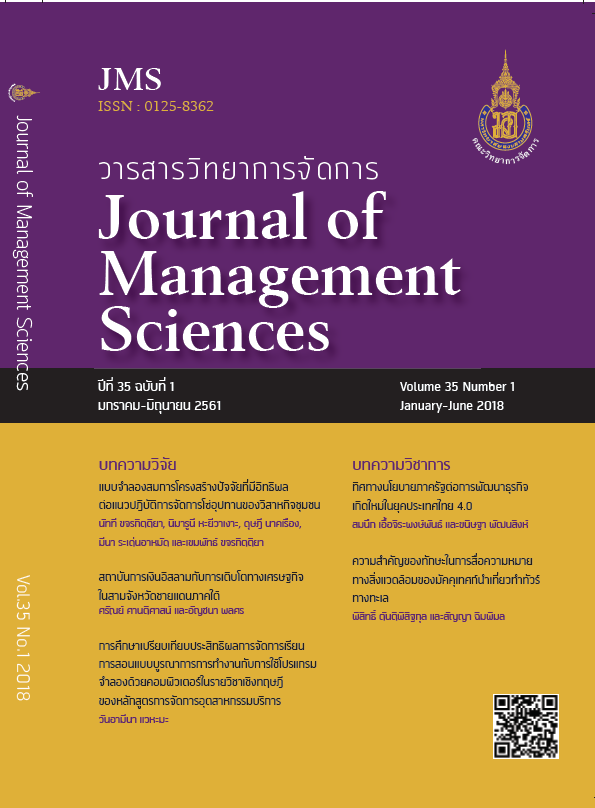แบบจำลองสมการโครงสร้างปัจจัยที่มีอิทธิพลต่อแนวปฏิบัติการจัดการโซ่อุปทานของวิสาหกิจชุมชน
Main Article Content
บทคัดย่อ
การศึกษานี้มีวัตถุประสงค์เพื่อวิเคราะห์แบบจำลองสมการโครงสร้างของปัจจัยที่มีอิทธิพลต่อแนวปฏิบัติการจัดการโซ่อุปทานของวิสาหกิจชุมชนในสามจังหวัดชายแดนภาคใต้ เก็บข้อมูลจากประธานและคณะกรรมการของกลุ่มวิสาหกิจชุมชนที่มีความเข้มแข็งระดับดี จำนวน 463 คน วิเคราะห์ข้อมูลด้วยโมเดลสมการโครงสร้าง พบว่า โมเดลโครงสร้างมีความสอดคล้องกับข้อมูลเชิงประจักษ์ดี โดยภาวะผู้นำการเปลี่ยนแปลง การมุ่งเน้นความเป็นผู้ประกอบการ มีอิทธิพลเชิงบวกต่อแนวปฏิบัติการจัดการโซ่อุปทาน ขณะที่ความสามารถในการบูรณาการความรู้ไม่มีอิทธิพลทางตรงเชิงบวกต่อแนวปฏิบัติการจัดการโซ่อุปทาน ดังนั้น หนทางหนึ่งในการเพิ่มความสามารถในการบูรณาการความรู้และแนวปฏิบัติการจัดการโซ่อุปทาน คือ ประธานกลุ่มวิสาหกิจควรมีการพูดคุยแลกเปลี่ยนความรู้ในการพัฒนาสินค้าทั้งภายในกลุ่มและระหว่างกลุ่มวิสาหกิจเพื่อสร้างความได้เปรียบในการแข่งขัน รวมทั้งประธานกลุ่มควรเข้าไปทำงานร่วมกับหน่วยงานภาครัฐในการส่งเสริมวิสาหกิจชุมชน เพื่อช่วยให้เกิดการแลกเปลี่ยนความรู้และการประสานการทำงานร่วมกันมากยิ่งขึ้นในอนาคต
Article Details

อนุญาตภายใต้เงื่อนไข Creative Commons Attribution-NonCommercial-NoDerivatives 4.0 International License.
บทความที่ตีพิมพ์ถือเป็นลิขสิทธิ์ของวารสารวิทยาการจัดการ มหาวิทยาลัยสงขลานครินทร์ อย่างไรก็ตาม กองบรรณาธิการไม่สงวนลิขสิทธิ์ในการทำซ้ำ คัดลอก หรือเผยแพร่ แต่จะต้องอ้างอิงให้ถูกต้องตามหลักวิชาการ
เอกสารอ้างอิง
Chong S.C., Wong K.Y., & Lin. (2006). Criteria for measuring KM performance outcomes in organisations. Industrial Management & Data Systems, 106 (7), 917-936.
Dvir, T., Eden, D., Avolio, B J., & Shamir, B. (2002). Impact of transformational leadership on follower development and performance: A field experiment. Academy of Management ,45(4), 735-44.
Eakure, N. (2011). The way to reach the capital of the enterprises and production network to develop the sustainable of community economic in the five southern provinces. Bangkok: The Thailand Research Fund.
Eddleston, K. A. (2008). Commentary: The Prequel to Family Firm Culture and Stewardship: The Leadership Perspective of the Founder. Entrepreneurship Theory and Practice, 32(6), 1055-1061.
Fantazy, K. A., Kumar, V., & Kumar, U. (2010). Supply management practices and performance in the Canadian hospitality industry. International Journal of Hospitality Management, 29(4), 685-693.
Grant, R. M. (1996). Toward a knowledge based theory of the firm. Strategic Management Journal, 17, 109–122.
Hair, J. F., Black, W. C., Babin, B. J., & Anderson, R.E. (2010). Multivariate Data Analysis. A Global Perspective 7th edition. New Jersey: Pearson education Inc.
Hamister, J. W. (2012). Supply chain management practices in small retailers. International Journal of Retail & Distribution Management, 40(6), 427-450.
Judge, T.A., & Piccolo, R.F. (2004). Transformational and transactional leadership: a meta-analytic test of their relative validity. Journal of Applied Psychology, 89(5), 755-768
Kim, K. & Im, I. (2002), The effects of electronic supply chain design (e-SCD) on coordination and knowledge sharing: an empirical investigation. Proceedings of the 35th Hawaii International conference on System Sciences, Kauai, HI, USA, pp. 1-10.
Kim, Y. J., Song, S., Sambamurthy, V., & Lee, Y. L. (2012). Entrepreneurship, knowledge integration capability, and firm performance: An empirical study Information Systems Frontiers, 14(5), 1047-1060.
Kline, R. B. (2011). Principles and practice of structural equation modeling 3rd ed. New York: The Guilford Press
Koh, S. C. L., Mehmet, D., Erkan, B., Ekrem, T., & Selim, Z. (2007). The impact of supply chain management practices on performance of SMEs. Industrial Management & Data Systems, 107(1), 103-124.
Li, S., Ragu-Nathan, B., Ragu-Nathan, T. S., & Subba Rao, S. (2006). The impact of supply chain management practices on competitive advantage and organizational performance. Omega, 34(2), 107-124
Li, Y.H., Huang, J.W., & Tsai, M.T. (2009). Entrepreneurial orientation and firm performance: The role of knowledge creation process. Industrial Marketing Management, 38(4), 440-449.
Moorhead, G & Griffin, R.W. (2010). Organizatinal Behavior: Managing people and organizations. China Translation & Printing Services Limited, China.
Muchiri, M.K. (2013). Entrepreneurial Orientation and Leadership: A Review, Model and Research Agenda, 26th Annual SEAANZ Conference Proceedings. (pp.1-15). Small Enterprise Association of Australia and New Zealand.
Prasad, S& Tata, J., (2010). Micro-enterprise supply chain management in developing countries, Journal of Advances in Management Research, 7(1): 8-31.
Promsaka Na Sakolnakorm, T.& Sungkharat, U. (2013). Development Guidelines for Small and Micro Community Enterprises in Songkhla Lake Basin. Songkhla: Department of Educational Foundation, Faculty of Liberal Arts.Prince of Songkla University.
Simchi-Levi, D., Kaminsky, P., & Simchi-Levi, E. (2006). Designing & managing the supply chain (Translated and edited by Walailak Atthirawong & Watcharavee Chandraprakailul).Bangkok: Top.
Sundram, V. P. K., Ibrahim, A. R., & Govindaraju, V. G. R. C. (2011). Supply chain management practices in the electronics industry in Malaysia: Consequences for supply chain performance. Benchmarking: An International Journal, 18(6), 834-855.
Trottier, T., Van Wart, M., & Wang, X.H. (2008). Examining the nature and significance of leadership in government organizations. Public Administration Review, 68(2), 319-333.
Vanichbuncha, K. (2008). Data analysis using SPSS for Windows (11thed.). Bangkok. Thailand: Thammasan.
Wai P.W., & Kuan Y. W. (2011). Supply chain management, knowledge management capability,and their linkages towards firm performance. Business Process Management,17(6),940-964.
Wiersma, W., & Jur, S. G. (2009). Research Methods in Education an Introduction. (9th ed.). Boston, MA: Pearson Education Inc.
Wong, W. P., & Wong, K. Y. (2011). Supply chain management, knowledge management capability, and their linkages towards firm performance. Business Process Management Journal, 17(6), 940-964.
Zhang, X.-a., Cao, Q., & Tjosvold, D. (2011). Linking Transformational Leadership and Team Performance: A Conflict Management Approach. Journal of Management Studies, 48(7), 1586-1611.
Zhou, H., & Benton, W. C. (2007). Supply chain practice and information sharing. Journal of Operations Management, 25(6), 1348-1365.

